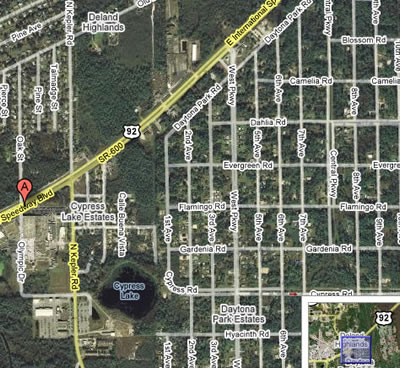Sherwood Medical (Tyco kendall) Groundwater Contamination Information
Florida Department of Health in Volusia County Environmental Health Engineering
- 386-274-0546
- vchdengineering@flhealth.gov
-
Fax
386-736-5433 -
Mailing Address
P.O. Box 9190
Daytona Beach, FL 32120
The purpose of this web site is to provide useful information to citizens and residents living near the Sherwood Medical Superfund site. The Sherwood Medical complex was located at 2010 East International Speedway Blvd., in DeLand, Florida shown by the balloon labeled A in the image below.

Click on each topic below for more information
Daytona Park and Cypress Lakes Estates Update - September 2009
Health Concerns Form - Complete this form if you have health concerns that you would like to submit. The submission address and phone number are on the form.
Cypress Lakes Estates Groundwater Contamination Information
Daytona Park Estates Groundwater Contamination Information
About the Department of Health (DOH) and the Agency for Toxic Substances and Disease Registry (ATSDR)
The Florida Department of Health (DOH) protects and promotes the health of people living around hazardous waste sites. We review environmental sampling taken from sites where chemicals may have gotten into the air, soil, or water. The federal Agency for Toxic Substances and Disease Registry funds this program to determine the risk for nearby residents. We work closely with county health departments. DOH reviews data from the Florida Department of Environmental Protection and the federal Environmental Protection Agency.
We write public health assessment (PHA) reports. A PHA gives a broad look at an entire hazardous waste site—the soil, water, and air. It looks at all potential health effects from known chemicals at a site. This type of report usually takes about one year to complete. However, if a public health threat is found, we will inform the community immediately. A PHA is not the same thing as a medical exam or a community health study. It looks at the types of chemicals and how much of them were found at a site. It checks this information against the known levels where human health effects could occur. A Public Health Assessment focuses on the present and the future. There is usually not much information or data from the past on the chemicals used or the levels. Occasionally, there is enough data from the past to make an estimate of possible effects from past exposures.
Almost any substance can be harmful at some level. Chemicals range from commonly known poisons like arsenic to less threatening substances such as table salt. We must know the exact substance and the exact amount of it that was present. “The poison is in the dose,” means that a chemical may not be harmful unless it is present in a certain amount. We cannot know if it could have any health effect until we know the actual amount of the chemical that was present. When this information is not available, the possible health effects are difficult to predict.
We consider many aspects of a hazardous waste site. Some of the main questions we ask are the following:
What are the levels, or amounts, of harmful substances present?
Can people be exposed to, or come in contact with, these substances?
Can this substance, in this amount, likely cause harm to people?
Are there any other dangers to people such as unsafe buildings or physical hazards?
When making public health decisions about hazardous waste sites, the Florida DOH uses the guidelines that apply to the most sensitive persons in the community. These include the children, the elderly, and pregnant or nursing mothers.
In addition to the environmental data we review, we also consider community concerns, reports, and questions concerning how the site affects people’s health or quality of life. We respond to the community in our report, fact sheets, and in meetings
Once a health assessment report is written we do the following things:
Advise the public on how to protect themselves from exposure to chemicals from a site
Inform the community of our findings and recommendations
Inform community healthcare professionals of our findings and give them helpful materials
Advise cleanup agencies on health issues
Florida DOH DOES NOT:
Make or enforce laws or rules concerning hazardous waste
Provide medical services for people exposed to hazardous waste
Provide cleanup or relocation
Take samples, except for some private well testing
For more information about our program, please call us toll-free during regular business hours: 1-877-798-2772
Or see our website for copies of past reports and many other materials. Please share this information with your friends, family and neighbors.



Connect with DOH